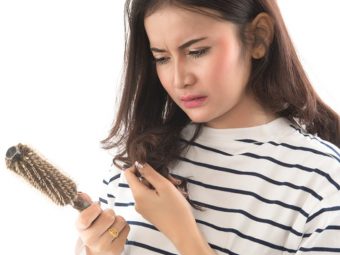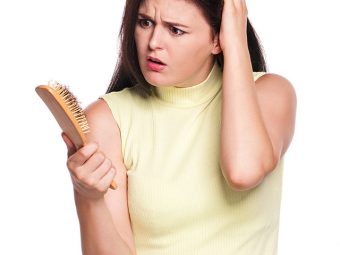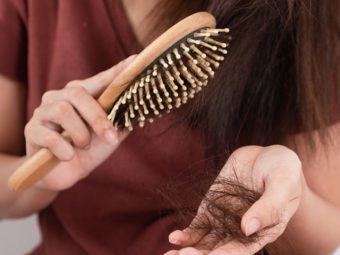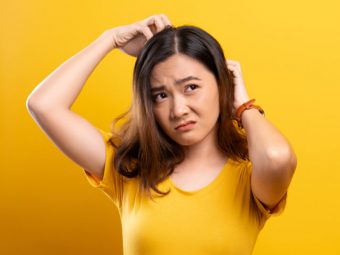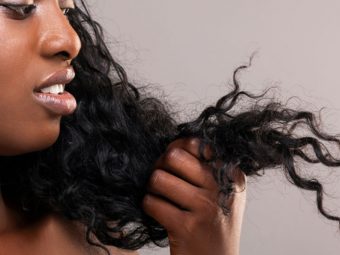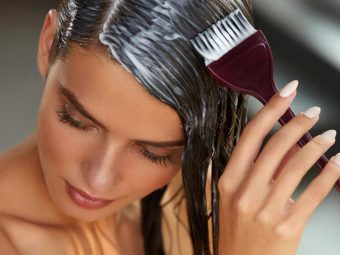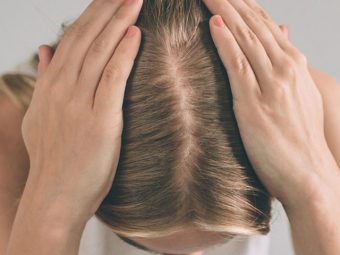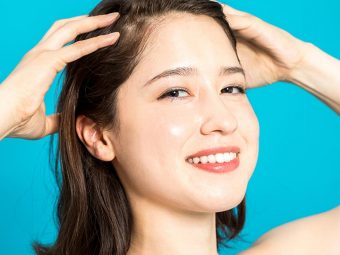Does Diabetes Cause Hair Loss? Causes, Treatment, & Prevention
Find out if there is a link between these two problems and what can be done to stop it.
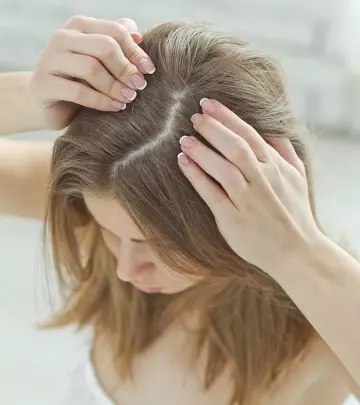
A 2020 report indicated that over 30 million people in the world are affected by diabetes (1). Diabetes is known to affect body weight and vision and may leave you feeling extremely tired. However, research also shows a correlation between diabetes and hair loss.
Alopecia areata, a type of hair loss, is an autoimmune condition that may be a lesser-known side effect of diabetes. While it may be temporary initially, this type of hair loss can become severe and permanent without timely treatment. Discover the relation between diabetes and hair growth right here. Keep reading to know if you can reverse or manage hair loss caused by diabetes.
In This Article
How Does Diabetes Affect Hair Growth?
Before you can understand how diabetes can affect hair growth, let us take a cursory glance at how human hair grows.
- Human hair grows out of tiny pocket-like structures on the skin called follicles. The root of each follicle is made of protein cells.
- The blood vessels nourish the follicle roots and promote hair growth.
However, diabetes can affect organs like the eyes, kidneys, heart, nerves, brain, and even the blood vessels. The damaged blood vessels restrict the flow of oxygen-rich blood to the scalp and hair follicles, interfering with the hair’s normal growth cycle.
But this is not the only cause of hair loss and hair thinning in people with diabetes. Here are some of the other reasons.
Common Causes Of Hair Loss In People With Diabetes
- High Blood Glucose Or Blood Sugar Levels
High blood sugar levels are dangerous for the body and can trigger hair loss. Spikes in the sugar levels can cause inflammation, injuring the blood vessels on the scalp. This can lead to hair thinning and eventually halt hair growth as the hair follicles do not get adequate supply of nutrients.
- Hormones And Stress
Hormones and stress can both affect the health of your hair. Those who have high blood glucose levels have a flat cortisol profile (2). In healthy humans, the cortisol (stress hormone) levels fluctuate. However, the cortisol levels remain unchanged in those with diabetes. Constant stress also increases the dihydrotestosterone (DHT) hormone, triggering hair loss (3).
- Alopecia
Diabetes may trigger insulin resistance, which may cause androgenetic alopecia, also known as pattern baldness. This is common in both men and women. This condition stimulates the dihydrotestosterone (DHT) binding to the androgenetic receptors, causing hair thinning and hair loss (4).
- Thyroid Imbalance
People with diabetes are more susceptible to thyroid disorders. Thyroid imbalance or hyperthyroidism may cause telogen effluvium or temporary hair loss (5). Telogen effluvium is often preceded by changes in the hair structure, such as dry, brittle hair, which may gradually reduce the hair volume.
- Iron Deficiency
While diabetes does not directly cause anemia, certain conditions or complications associated with diabetes, such as kidney impairments, may cause iron deficiencies. Research shows that iron deficiency may cause pattern baldness (6).
- Bariatric Surgery
Bariatric surgery or weight loss surgery is often recommended as an effective treatment for managing type 2 diabetes. Rapid weight loss may also cause hair loss.
- Nutritional Deficiencies
Diet naturally plays a huge role in keeping your hair healthy. However, nutritional deficiencies are quite common in people with diabetes (7). Deficiencies in folate, biotin, riboflavin, and vitamin B12 have been particularly associated with hair loss (8).
- Dehydration
Dehydration may not cause direct hair loss, but it can definitely contribute to dry, brittle strands and increased shedding. It also leads to reduced blood flow to the scalp, causing a lack of essential nutrients reaching the hair follicles and impacting their ability to produce healthy hair (9). Therefore, adequate hydration is crucial for promoting overall health and supporting hair follicles.
- Vitamin D Deficiency
Vitamin D deficiency can disrupt the normal hair growth cycle, leading to excessive shedding and thinning. You can consult your doctor and get a blood test to check your levels. Depending on the results, they may recommend dietary changes, increased sun exposure, or vitamin D supplements to address the deficiency and potentially support hair health (10).
Apart from these causes, the type of diabetes may also determine your risk for hair loss. Let us understand the connection.
Does The Type Of Diabetes Contribute To Hair Loss?
Yes. Both type 1 and type 2 diabetes can cause hair loss. However, androgenetic alopecia is specifically related to type 2 diabetes, and alopecia areata is common in type 1 diabetes (4), (11). People with Type 1 diabetes are also at a higher risk of developing thyroid disorders, nutritional deficiencies, and stress that can impact the hair growth cycle.
A 2015 survey with 5389 women involved studying their hair loss over time. Over the follow-up, 850 women experienced severe hair loss. The study concluded that women with severe hair loss have a 1.68 times higher risk of developing diabetes compared to those without severe hair loss. Moreover, those with diabetes for at least 10 years had a risk increased to 2.05 times in comparison to those without diabetes.
Maddie Nielson, a vlogger, shares her experience of facing hair loss after being diagnosed with Type 1 diabetes. She said, “First of all, I think the stress of dealing with a new diagnosis of type 1 diabetes definitely had a lot to do with hair (i).”
If you are curious which regions can experience hair loss most from diabetes, read on to get the straight facts.
Which Regions Are Most Affected By Hair Loss Due To Diabetes?
Hair loss from your lower body is an early marker of type 2 diabetes. Research found that type 2 diabetes caused hair loss beneath the knees (11).
Diabetes causes hair loss, especially from the scalp and the lower legs. It may also cause hair loss in other body parts. However, the difference is difficult to ascertain in the rest of the body compared to the upper and lower extremities.
The good news is, some treatments can reverse or slow hair loss. Read on to know how hair loss can be treated in people with diabetes.
Treating Hair Loss In People With Diabetes
With accurate diagnosis and early treatment, hair loss can be both prevented and treated. The following are some options for treating hair loss in people with diabetes.
The doctor may recommend these options depending on the severity of the condition, other health-related factors, and personal preferences.
- Topical Medication
Minoxidil is a commonly prescribed FDA-approved over-the-counter treatment for hair loss (12). It affects the follicular cells and promotes hair growth and minimizes hair loss. However, the medication is not a permanent solution for hair loss and may need to be used on an ongoing basis for achieving continued results.
- HbA1c And Blood Sugar Management
Managing blood sugar levels is another effective way to reverse or stop hair loss due to diabetes. According to the American Diabetes Association, adults with diabetes should aim to keep their A1C (a test used to diagnose diabetes) at less than 7% (13). This will improve your overall health and lower the risk of hair loss.
- Nutrition
If your body does not get enough nutrition, it may affect its functions, including hair health. A blood test can reveal any such nutritional deficiencies. The doctor may suggest taking supplements for iron, biotin, zinc, and folic acid deficiencies. These are widely recommended for promoting hair growth.
They may also suggest cosmetic, surgical, and other treatment options to minimize hair loss.
Other Treatment Options To Minimize Hair Loss
1. Laser Therapy
Laser therapy is a painless, non-invasive, and safe procedure and is often suggested by doctors to minimize hair loss. The lasers are targeted at the treatment area to stimulate the hair follicles and promote hair growth. The doctor may use lasers of different wavelengths and clinical strengths, depending on your condition.
2. Injections Of Immunosuppressive Drugs Or Corticosteroids
Corticosteroids and immunosuppressant drugs, such as methotrexate and cyclosporine, are sometimes used to treat alopecia areata (14). These medications are directly injected into the balding or thinning area (under the dermis) to stop inflammation, which, in turn, may promote hair regrowth. The injections may need to be administered every 4 to 8 weeks or more often.
3. Hair Transplant
Hair transplant is another effective and permanent solution for hair loss. Hair transplant involves taking hair from thicker parts of the scalp and planting it on balding or thinning areas.
4. Platelet-Rich Plasma (PRP)
Platelet-rich plasma is a safe treatment for hair loss (15). Here is how the procedure works:
- A small amount of blood is drawn from the arm.
- The platelet-rich plasma is separated from the rest of the blood’s components.
- It is injected into the target areas.
While the procedure is not very long, you may have to return for repeat injections recommended by your dermatologist.
5. Microneedling
Microneedling, along with minoxidil, is effective in treating androgenetic alopecia (16). This is a dermaroller procedure that uses a roller with needles to prick the skin. It is mainly used as an anti-aging procedure but can be used on the scalp too.
6. Prescription Medications
Apart from conservative and invasive treatment options, hair loss can also be treated with prescription medications. Prescription medications to treat hair loss include:
1. Finasteride For Pattern Hair Loss
Finasteride is an FDA-approved drug for treating pattern hair loss. Research shows that taking 5mg/day finasteride can treat female pattern androgenetic alopecia. However, it may also cause libido reduction (17).
2. Spironolactone For Female Pattern Hair Loss
Spironolactone is the prescription medication for female pattern hair loss (18). It helps increase hair thickness and reduce hair loss. However, this medication is not safe to take during pregnancy.
There is no doubt that medical treatments and medications are some of the most effective ways to treat hair loss. However, self-care and developing healthy habits are equally important for preventing hair loss. Here are a few tips to take care of yourself and your hair at home.
Tips To Naturally Prevent Hair Loss From Diabetes
- Monitor Blood Sugar Levels
Regulating your blood sugar levels can help reduce side effects like hair loss. Once you control the blood sugar levels, your hair loss will naturally slow down.
- Reduce Physical And Emotional Stress
The impact of stress on hair loss is considerable. You can be especially sensitive to stress if you have diabetes. Try to control your stress levels. Do not push yourself and try to relax by practicing deep breathing exercises, meditation, or yoga.
- Exercise
Exercise can improve blood circulation to your body’s cells, including your hair follicles. It is also good for maintaining your physical and mental health.
 Pro Tip
Pro Tip- Establish A Healthy Hair Care Routine
Your daily hair care routine can affect the health of your locks. Try the following tips to offset the chances of hair loss:
- Avoid hair-damaging procedures, such as coloring, straightening, or perming.
- Limit the use of flat irons, curling tools, or hot combs.
- Use a gentle shampoo and conditioner.
- Try Essential Oils
Essential oils may have various beneficial effects on hair health. Some oils worth trying are:
- Lavender
- Peppermint
- Rosemary
- Thyme
- Lemongrass
- Clary sage
- Tea tree essential oil
You may mix them with carrier oils and massage the scalp. This can keep the scalp and the hair healthy.
- Eat Healthy
If your diet is low in whole grains, fruits and vegetables, dairy products, and other nutrient-rich foods, you are bound to experience a lot of hair loss. Hence, it is important to start eating healthy.
 Quick Tip
Quick TipTo Conclude
Diabetes and hair loss share a direct yet relatively unknown connection. Diabetes may restrict blood flow to the scalp, alter hormonal levels, or lead to nutritional deficiencies. The subsequent hair loss can be permanent and need medical attention. Consult your healthcare provider if you notice significant hair loss to determine what is causing this hair trouble. Immediate medical intervention is necessary if diabetes is the primary driver behind this hair loss. If you are undergoing any treatment for this condition, take special care of your mane and keep a close eye on your stress levels to reduce hair loss.
Frequently Asked Questions
Is hair loss a sign of diabetes?
Hair loss could be a sign of diabetes as many people with diabetes tend to have alopecia areata that causes hair fall.
Does prediabetes cause hair loss?
Yes, prediabetes is usually a symptom of insulin resistance, which can cause unusual hair loss.
Does Victoza cause hair loss?
Yes, Victoza, an injectable prescription drug used to treat diabetes, is known to cause hair loss. Talk to your doctor if you notice symptoms of hair loss after using Victoza.
What vitamins are recommended for hair loss related to diabetes?
Vitamins A, C, D, B12, and biotin can improve hair loss symptoms.
Do diabetic medications cause hair loss?
Yes, diabetic medications, especially corticosteroids, may cause hair loss.
References
Articles on StyleCraze are backed by verified information from peer-reviewed and academic research papers, reputed organizations, research institutions, and medical associations to ensure accuracy and relevance. Read our editorial policy to learn more.
- National Diabetes Statistics Report, 2020
www.cdc.gov/diabetes/data/statistics-report/index.html - The longitudinal association of changes in diurnal cortisol features with fasting glucose: MESA
https://www.sciencedirect.com/science/article/abs/pii/S0306453020301177? - Hair and stress: A pilot study of hair and cytokine balance alteration in healthy young women under major exam stress
https://www.ncbi.nlm.nih.gov/pmc/articles/PMC5397031/ - Androgenetic alopecia, metabolic syndrome, and insulin resistance: Is there any association? A case–control study
https://www.ncbi.nlm.nih.gov/pmc/articles/PMC4144211/ - Thyroid Hormones Directly Alter Human Hair Follicle Functions: Anagen Prolongation and Stimulation of Both Hair Matrix Keratinocyte Proliferation and Hair Pigmentation
academic.oup.com/jcem/article/93/11/4381/2627273 - Iron Plays a Certain Role in Patterned Hair Loss
https://www.ncbi.nlm.nih.gov/pmc/articles/PMC3678013/ - Potential micronutrient deficiency lacks recognition in diabetes
www.ncbi.nlm.nih.gov/pmc/articles/PMC2032692/ - Diet and hair loss: effects of nutrient deficiency and supplement use
https://www.ncbi.nlm.nih.gov/pmc/articles/PMC5315033/ - Standardized Scalp Massage Results in Increased Hair Thickness by Inducing Stretching Forces to Dermal Papilla Cells in the Subcutaneous Tissue
https://www.ncbi.nlm.nih.gov/pmc/articles/PMC4740347/ - Role of vitamin D in hair loss: A short review
https://pubmed.ncbi.nlm.nih.gov/34553483/ - Hair Follicle Characteristics As Early Marker Of Type 2 Diabetes
https://www.ncbi.nlm.nih.gov/pmc/articles/PMC5073072/ - Minoxidil and its use in hair disorders: a review
https://www.ncbi.nlm.nih.gov/pmc/articles/PMC6691938/ - Understanding A1C
www.diabetes.org/a1c - Alopecia areata: a new treatment plan
https://www.ncbi.nlm.nih.gov/pmc/articles/PMC3149478/ - The Effect of Platelet-Rich Plasma in Hair Regrowth: A Randomized Placebo-Controlled Trial
https://www.ncbi.nlm.nih.gov/pmc/articles/PMC4622412/ - A Randomized Evaluator Blinded Study of Effect of Microneedling in Androgenetic Alopecia: A Pilot Study
https://www.ncbi.nlm.nih.gov/pmc/articles/PMC3746236/ - Finasteride 5 mg/day Treatment of Patterned Hair Loss in Normo-androgenetic Postmenopausal Women
https://www.ncbi.nlm.nih.gov/pmc/articles/PMC3746222/ - Hormonal therapy in female pattern hair loss
https://www.ncbi.nlm.nih.gov/pmc/articles/PMC5419033/ - Hair Loss Due To Menopause: Everything You Need To Know
- 10 Best Hair Growth Sprays
- 11 Tips To Grow Your Hair Back With The Right Diet





